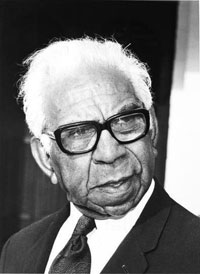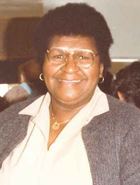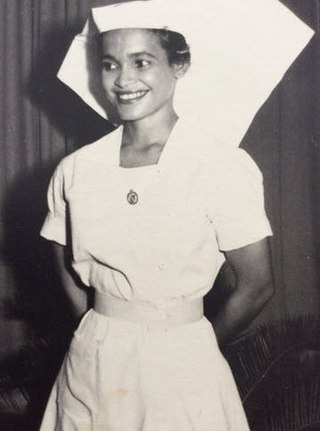Related Research Articles

Sir Douglas Ralph Nicholls was a prominent Aboriginal Australian from the Yorta Yorta people. He was a professional athlete, Churches of Christ pastor and church planter, ceremonial officer and a pioneering campaigner for reconciliation.

Swan Hill is a city in the northwest of Victoria, Australia on the Murray Valley Highway and on the south bank of the Murray River, downstream from the junction of the Loddon River. At 2021 census, Swan Hill had a population of 11,508.
Indigenous Australian self-determination, also known as Aboriginal Australian self-determination, is the power relating to self-governance by Aboriginal and Torres Strait Islander peoples in Australia. It is the right of Aboriginal and Torres Strait Islander peoples to determine their own political status and pursue their own economic, social and cultural interests. Self-determination asserts that Aboriginal and Torres Strait Islander peoples should direct and implement Aboriginal and Torres Strait Islander policy formulation and provision of services. Self-determination encompasses both Aboriginal land rights and self-governance, and may also be supported by a treaty between a government and an Indigenous group in Australia.
The Gunditjmara or Gunditjamara, also known as Dhauwurd Wurrung, are an Aboriginal Australian people of southwestern Victoria. They are the traditional owners of the areas now encompassing Warrnambool, Port Fairy, Woolsthorpe and Portland. Their land includes much of the Budj Bim heritage areas. The Kerrup Jmara are a clan of the Gunditjmara, whose traditional lands are around Lake Condah. The Koroitgundidj are another clan group, whose lands are around Tower Hill.
Deborah Joy Cheetham Fraillon, is an Aboriginal Australian soprano, actor, composer and playwright.
Dhauwurd Wurrung is a term used for a group of languages spoken by various groups of the Gunditjmara people of the Western District of Victoria, Australia. Keerray Woorroong is regarded by some as a separate language, by others as a dialect. The dialect continuum consisted of various lects such as Kuurn Kopan Noot, Big Wurrung, Gai Wurrung, and others. There was no traditional name for the entire dialect continuum and it has been classified and labelled differently by different linguists and researchers. The group of languages is also referred to as Gunditjmara language and the Warrnambool language.
The Victorian Honour Roll of Women was established in 2001 to recognise the achievements of women from the Australian state of Victoria. The Honour Roll was established as part of the celebrations of Victoria's Centenary of Federation.
Uncle Albert Mullett (1933–2014) was a respected Aboriginal Elder in Victoria, Australia, and spokesperson for members of the Gunai/Kurnai peoples, Gippsland, Victoria. His ancestry includes Gunditjmara and Gunai/Kurnai clans. He was actively involved in Aboriginal education and the preservation of Koorie cultural heritage for many years. He was also a skilled craftsman of shields, boomerangs and artifacts.
Hyllus Noel Maris was an Aboriginal Australian activist, poet and educator. Maris was a Yorta Yorta woman. She was a key figure in the Aboriginal rights movement of the 1970s and 1980s, a poet, an educator and an award-winning scriptwriter.

Eleanor Harding (1934-1996) was an Indigenous Australian from the Torres Strait Islands who worked to attain civil rights for Aboriginal Australians. She advocated for women's rights and adequate educational opportunities, as well, serving with numerous organizations to attain equality for indigenous people. In 2012, she was inducted into the Victorian Aboriginal Honour Roll by the State of Victoria.
Alma Beryl Thorpe, also known as Aunty Alma Thorpe, is an Australian Aboriginal elder and activist. In 1973 she co-founded the Victorian Aboriginal Health Service (VAHS), together with her mother, Edna Brown, and Bruce McGuinness.
Aunty Diane Kerr is an Indigenous Australian Wurundjeri Elder who identifies with the Ganun Willam Balak clan. She has contributed to Australian society through her work with the Aboriginal and Torres Strait Islander community and government in a range of fields including health, child care, education, native title, Stolen Generation support, and other community work.

Lidia Alma Thorpe is an Aboriginal Australian independent politician. She has been a senator for Victoria since 2020 and is the first Aboriginal senator from that state. She was a member of the Australian Greens until February 2023 when she quit the party over disagreements concerning the proposed Indigenous Voice to Parliament. She had also served as the Greens' deputy leader in the Senate from June to October 2022.

MaryAnn Bin-Sallik is a Djaru Elder and Australian academic, specialising in Indigenous studies and culture. She was the first Indigenous Australian to gain a doctorate from Harvard University.
Muriel Pauline Bamblett is a Yorta Yorta and Dja Dja Wurrung advocate for Aboriginal child welfare in Victoria and Australia.
The 2019 Victorian First Peoples' Assembly election was held between 16 September to 20 October 2019 to elect 21 members to the First Peoples' Assembly in the Australian state of Victoria. The election filled seats to the body, which was charged with the responsibility of preparing for negotiations with the Victorian Government about a treaty with the state's Aboriginal population.
Maree Clarke is an Australian multidisciplinary artist and curator from Victoria, renowned for her work in reviving south-eastern Aboriginal Australian art practices.
Elizabeth Maud Hoffman, née Morgan, also known as Aunty Liz or Yarmauk, was an Australian Indigenous rights activist and public servant. She co-founded the first Indigenous Woman's Refuge in Australia, named "The Elizabeth Hoffman House" in her honour. She was one of 250 women included in the Victorian Honour Roll of Women in 2001 and received the inaugural NAIDOC Lifetime Achievement Award in 2006.
Dorothy Betsy Peters, (1930–2019) was an Australian indigenous community leader and artist. Peters was born in Melbourne in 1930, as the daughter of Vincent and Daisy Peters. She died in 2019.
The 2023 Victorian First Peoples' Assembly election, advertised as the 2023 Treaty election, was held June 2023 to elect 22 members to the First Peoples' Assembly in the Australian state of Victoria. The election filled 22 of 32 seats to the body, which was charged with the responsibility of negotiating a treaty between the state's government and its Aboriginal and Torres Strait Islander population.
References
- 1 2 3 4 5 6 7 "Jill Gallagher AO". vic.gov.au. Archived from the original on 15 March 2017.
- 1 2 James, Daniel (9 July 2018). "Jill Gallagher and the road ahead for Victoria's Treaty". indigenousx.com.au. Archived from the original on 12 October 2019.
- 1 2 Stark, Jill (26 January 2013). "Improving outcomes in Aboriginal health". smh.com.au. Archived from the original on 30 January 2013. Retrieved 15 October 2019.
- ↑ Miller, Nick (13 January 2008). "Kicking the habit of a lifetime". The Sydney Morning Herald. Sydney, Australia. Archived from the original on 22 November 2019.
- ↑ "Jill Gallagher". wheelercentre.com. Archived from the original on 22 November 2019. Retrieved 22 November 2019.
- ↑ Michael, Luke (29 January 2019). "A Vision for a Culturally Confident Aboriginal Community". probonoaustralia.com.au. Archived from the original on 29 January 2018. Retrieved 15 October 2019.
- ↑ Donaldson, David (10 September 2018). "Please don't be bystanders': treaty commissioner calls for public support". themandarin.com.au. Archived from the original on 15 October 2019. Retrieved 15 October 2019.
- ↑ "Rethinking cancer, Rising Hope Workshop brings leaders together". Vaccho News: 8. Winter 2014.
- ↑ "Having a yarn about bowel cancer - the official launch". cutyourcancerrisk.org. 26 September 2011. Archived from the original on 4 November 2019. Retrieved 4 November 2019.
- ↑ "VICTORIAN HONOUR ROLL OF WOMEN List of Inductees 2001 to 2011" (PDF). whise.org.au. Archived (PDF) from the original on 18 February 2017. Retrieved 22 November 2019.
- ↑ "Officer (AO) in the General Division of the Order of Australia" (PDF). gg.gov.au. 26 January 2013. p. 14. Archived (PDF) from the original on 5 November 2019. Retrieved 5 November 2019.
- ↑ "Australia Day 2013 Honours List". smh.com.au. 25 January 2013. Archived from the original on 28 January 2013. Retrieved 14 October 2019.